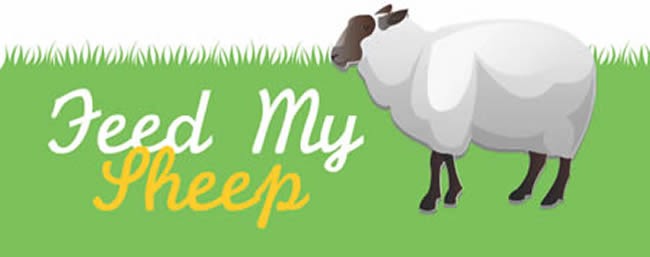FEED MY SHEEP

Why did Jesus ask Peter three times, "Do you love me?" It has been said that Peter denied Jesus three times; and, therefore, Jesus made Peter claim his love for Him three times. The three questions seem to be the same; however, in Greek, they are different.
Jesus calls him, "Simon, son of Jonah," his old name. Previously, Jesus had changed his name to Cephas, meaning "rock-man" in Aramaic; and in Greek, petro; in English, Peter. In these three questions Jesus uses his old name, “Simon, son of Jonah,” reminding Peter that he had not acted as a "rock-man" when he had denied Jesus a couple of nights earlier. However, Jesus did not do this to embarrass Peter but to remind him of his weakness and need of the Lord to make him a "rock-man."
Then Jesus said, "Do you love me more than these?" referring to the disciples. Peter answers, "Lord, you know that I love you." The word that Jesus used for love was “agapaō.” The Greek word for friendship is “phileō.” But “agapaō” is the greatest form of love. It is the word that the Bible uses for God's love and the Christians' love for one another in the church. But Peter responded with the word “phileō” instead of “agapaō.” He had said to Jesus, "You know that I love you as a friend."
I think he was still ashamed to have denied Jesus, so he uses a minor term, "I have affection for you." Jesus said to him, "Feed my lambs." Feed my baby sheep. This also applies to us. If we truly love Jesus, we would take care of the fragile, the baby sheep.
At the moment of initiating activities through Kinship, in the beautiful country of Colombia, we noticed many cases where the little sheep needed tender care from the other members of the group, such gestures as birthday wishes, phone calls or messages to find out how their day is going, and reunions that build camaraderie and fraternity, allowing them to feel special and loved by the flock.
It is clear what Jesus meant. He had loved them. He had cared for them. Now Jesus asks him to do the same for others. Care for them, love them because I have loved you. During the last supper, Jesus told the disciples, “A new commandment I give to you, that you love one another; as I have loved you, that you also love one another” (John 13:34). Our love is not only to be shown among Christians but to be shown to those that are not Christian or even to those who do not love us. Jesus said, “But love your enemies, do good…and you will be sons of the Most High. For He is kind to the unthankful and evil” (Luke 6:35).
If you love Jesus, then show that love to others, especially to those who are not part of the Kinship family. Love them, talk to them, spend time with them, take care of them. Feed my sheep!
The message is clear for our community, for our church, for our LGBTIQ baby sheep. Our love for each other should be unique and special just as the Savior loves us.
By Yohny Ochoa Martínez
Kinship Coordinator, Colombia
